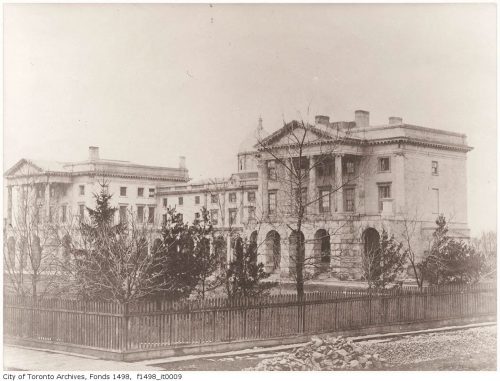


William Armstrong (1822-1914) was born in Dublin, Ireland. He studied art before moving to England where he trained in engineering through an apprenticeship with the Midland Railway. In 1851 he immigrated to Toronto and put his engineering and drawing skills to work as an employee of the Grand Trunk and the Northern railways. While working for the railway companies he produced a series of watercolour paintings of railway bridges, and although it is not known where he learned photography he steadily earned a reputation in Toronto as a photographer as well as a painter.
In 1855 William Armstrong left the railway and started the civil engineering and photography firm Armstrong and Beere in partnership with his nephew Daniel Manders Beere (1833-1909). Two years later Humphrey Lloyd Hime (1833-1903) joined the company, which became Armstrong, Beere and Hime. Their work met with immediate acclaim and in their first year together they took first and second prize for the best collection of uncoloured photographs, and second prize in the coloured category at the Twelfth Annual Exhibition of the Provincial Agricultural Association at Brantford.
H.L. Hime temporarily left the company in 1858 to accept employment as the official photographer to the Assiniboine and Saskatchewan exploring expedition led by Henry Youle Hind, and his contribution to Canadian photography rests substantially with the superb photographs he produced while on this expedition. Hime returned to Toronto and resumed working at Armstrong, Beere and Hime until 1861 when the company went out of business and he began a career in finance.

D.M. Beere moved to New Zealand in 1863 where he was employed as a surveyor with the Auckland Provincial Government. He continued to take photographs and produced an impressive series of pictures documenting the Waikato Militia, of which he was a member.
William Armstrong gained considerable recognition as a watercolour painter, and in 1871 he began a career as an art instructor at the Toronto Normal School. Armstrong retired in 1897 but continued teaching art from his home on Augusta Avenue until he died at the age of ninety-three.
Back to introduction
Next page – Hiding in Plain Sight